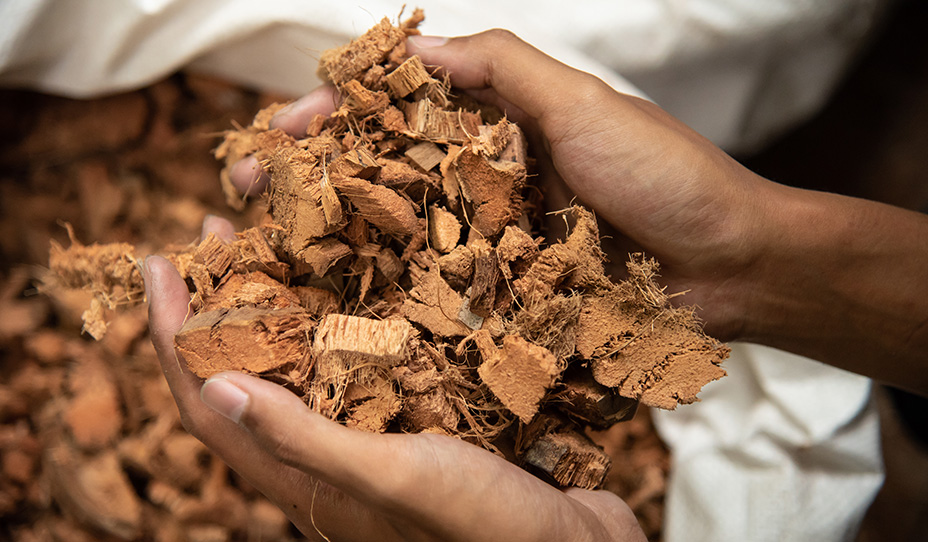Fiber production is a rapidly evolving industry and is moving fashion in a more sustainable direction. As...

Fiber technology for the future of fashion
- By Katie Syk
Fiber production is a rapidly evolving industry and is moving fashion in a more sustainable direction. As brands and consumers raise questions about fashion for the planet, a number of fiber technologies are becoming widespread. Learn more about several of those technologies in our blog post here.

Fiber technology encompasses a wide range of material innovations. From bio-based fibers made from renewable resources to fiber recycling technology, so much development is happening now. Here, we take a look at just a few fiber technologies that are helping to change fashion for future generations.
Tencel fabric’s circular model
Tencel is a type of man-made fabric fiber created from natural materials: cotton textile waste and wood (mostly from eucalyptus trees). With a composition of at least 30% recycled material, Tencel saves cotton scraps from being incinerated or sent to landfills, using them instead to create more fabrics and contributing to a circular economy.
Breathable and soft by nature, Tencel is well suited to making almost any type of clothing or textile. The state-of-the-art production processes – the most recognized of which is REFIBRA™ – used to create this high-comfort material are efficient to a tee. And the reduced need for virgin raw materials is vital for the future of fashion.

Transparency with REFIBRA™
This revolutionary textile technology uses pre- and post-consumer cotton waste combined with Tencel fabric fibers to create a fully traceable and sustainable material alternative. Another contributor to circular fabric production, REFIBRA™ also improves supply chain transparency, offering sourcing teams a sustainable option for their upcoming product lines.
Fiber technology encompasses a wide range of material innovations. From bio-based fibers made from renewable resources to fiber recycling technology, so much development is happening now.
Biodegradable spandex
You’re likely well-acquainted with spandex: the stretchy, translucent material that gives a perfectly fitted look? A staple of most moms’ closets pre-1999? But did you know that 80% of clothing contains at least some amount of spandex? Clothing that’s even a tiny bit stretchy usually has a small percentage of spandex (sometimes referred to as elastane) in it. Unfortunately, any amount of spandex makes it impossible to recycle the garment. The need for biodegradable spandex is immense – and is now an option for fabric sourcing professionals globally.
Some examples of biodegradable spandex include Lycra® EcoMade fiber, creora® regen by HYOSUNG, ROICA™ EF by AsahiKASEI, which can be made from pre-consumer spandex manufacturing waste, reclaimed production waste, recycled PET bottles and pre-consumer materials. Trace amounts of these biodegradable elastane options in clothing of all types mean their end of life doesn’t need to damage the planet. Landfills everywhere can breathe a bit easier, and so can all of us here on Earth.

Tracing textile fibers
In this age of transparency, it’s important to be upfront about your products’ backstory. Which means you need to know that backstory, inside and out. Traceable fiber technologies allow for this insight via various means: an invisible pigment, a DNA tag, or a trace minerals added to the fibers. Knowing the origins of the clothing we produce is an important part of making sure it aligns with our standards while still giving consumers a product they’ll be able to use over and over again.
Sourcing fiber technology fabrics
Today’s fabric industry is laden with options, and finding the best quality is certainly a challenge in this over-saturated market. Achieving quality in line with sustainability standards is even more difficult. Material Exchange – with the help of our AI sourcing expert, Frank the bear – is making it easier with a carefully curated marketplace of fabrics – and now we’ve got a Fiber technology collection of denim fabrics for innovative brands to explore. Check out the collection here and let your imagination run wild with all the possibilities for your upcoming line:
Fiber technology has come a long way, and the future is bright. Add our collection to your bookmarks to stay up-to-date on new materials and take your upcoming line to the next level.
Related content
Some of the most luxurious fabrics in the world are made using Egyptian cotton - and denim...
Our sourcing expert Frank the bear isn't just a regular bear. He's quite the fashionista and is...
The recycling of fabrics is well-covered in the press, and donation sites are aplenty for end-of-life garments...




